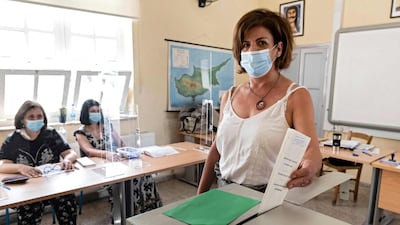Cypriots on Sunday voted in parliamentary elections amid public anger over the "golden passports" corruption scandal on the Mediterranean island.
Despite the furore, the conservative ruling party DISY lost only one seat, while the ultra-nationalist and anti-migration ELAM party doubled its presence to four seats from two.
Unusually for Cyprus, the decades-old division between the island's Greek and Turkish-speaking communities has played little part in this year's election campaign.
"There is a very unhappy electorate fed up with the political elite and Parliament," Hubert Faustmann, professor of history and political science at the University of Nicosia, said before the poll.
"People are fed up with corruption in public life."
A record 658 candidates from 15 parties were vying for 56 seats in Parliament.
The poll was limited to just over half a million voters in government-held areas, excluding the breakaway Turkish-backed region in the northern third of the island.
The DISY took more than 27 per cent of the vote and remained the largest force in Parliament, while the communist AKEL was second with one of its worst performances at just 22 per cent, official results showed late on Sunday.
The ELAM, which took 6.78 per cent of the vote and became the fourth-largest party, began as an offshoot of Greece's controversial Golden Dawn party and entered Parliament at the last legislative elections in 2016.
Meanwhile, migrant arrivals in the EU's most easterly state have placed Cyprus in what the government calls a "state of emergency".
Major opposition parties were unable to exploit public dissatisfaction with the government, while smaller parties largely failed to attract a significant protest vote.
The result again left the DISY without a majority, forcing President Nicos Anastasiades to continue with a minority government.
Cyprus last November dropped its passport-for-investment scheme after an Al Jazeera documentary in which reporters pretended to seek a passport for a Chinese businessman despite him having a criminal record.
Parliament was at the centre of the furore after speaker Demetris Syllouris and an opposition legislator were secretly filmed, allegedly trying to enable the passport for the fugitive investor.
They later resigned, although both insisted they were innocent of any wrongdoing.
Cyprus has an executive system of government with the president elected separately, but the vote was also regarded as a gauge of the popularity of Mr Anastasiades, whose term expires in 2023.
Cyprus also has the highest per capita number of first-time asylum seekers in the 27-member bloc, according to the Eurostat statistics agency. Immigration is a hot-button issue.
Chief returning officer Costas Constantinou said turnout hit a new low with 63.9 per cent, down from 66.7 per cent in 2016.
But Mr Constantinou said he was "very satisfied" with the figure, considering the vote was held during the Covid-19 pandemic.
Prominent lawyer Achilleas Demetriades called for a vote for reforms in an opinion piece for the Cyprus Mail under the headline, "From corruption to an honest state".
"New coalitions and new policies are necessary," Mr Demetriades wrote. "The autocratic approach and arrogance must be replaced with modern approaches to politics."
The last round of UN-backed Cyprus reunification talks collapsed in acrimony in 2017 and a UN summit in Geneva last month failed to reach an agreement on resuming talks.

